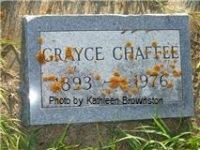Ah, the little white lie. We’ve all been the recipient and some of us have told that small little lie to protect someone’s feelings. But this post is about those lies we tell ourselves. All genealogists have heard them at one time or another and many of us continue to whisper these lies to ourselves every time we search for those long-lost, elusive family members. Here are 5 lies genealogists like to tell themselves and others, in no particular order.
Lie #1 – Tombstones (and obituaries) are always correct.
Wow! Really? Have you ever read a tombstone and said, “That doesn’t make any sense?” A case in point: here is a photo of my great-grandfather Ambrose Daniel Chaffee’s wife’s tombstone. Notice her name? It is engraved as Grayce. Wrong. Her name was Grace. I can’t tell you how many messages I’ve received on Findagrave.com to correct the spelling so it matches the tombstone, I finally had to put a note on her memorial explaining the issue.

When my great-grandmother Jennie Toledo (Leda) Cox McWherter died in Idaho in 1954, her daughter Ruth McWherter Stone submitted the obituary to the paper. The obituary lists Leda’s birthplace as Arkansas. Arkansas? No one in the family ever lived in Arkansas, Leda was born in Missouri, something Ruth had known all her life.
Don’t put blind trust in documents or facts, verify everything.
Lie #2 – Divorce was uncommon.
I don’t know about your family, but my research is rife with divorce. The earliest recorded North American divorce I found was in Massachusetts Bay Colony on January 5, 1643 when Anne Clarke divorced her husband Denis.
In my own family, my 4th great-grandmother Almira Mary Sisson divorced my 4th great-grandfather William Shaw Duel on December 28, 1859 while he was serving time in prison for the rape of their daughter. Their son George Robinson Duel, my 3rd great-grandfather divorced his wife Sybilla Milling sometime around 1852. A fact that George’s second family’s descendants had difficulty in accepting once our branch publicized it.
Be open to the possibility of divorce, abandonment, remarriage.
Lie #3 – People rarely traveled in the 18th and 19th centuries.
When I look at the census and land records of the families in my tree I am amazed at the number of miles they traveled. John S Messler was born in 1797 in New Jersey, he moved to Philadelphia and then to Butler County, Ohio, bought land in Decatur County, Indiana and died in 1840 in Union County, Indiana. In those 43 years he had traveled well over a thousand miles.
My 5th great-grandparents Micajah Brown and Catherine McDowell traveled from North Carolina to Kentucky, to Tennessee, before finally landing in Missouri. All this in the years 1807-1820.
Don’t believe what others say. Look for movement, find the migration patterns of others from the same areas because families seemed to move as a group with their neighbors and extended relatives.
Lie #4 – Finding records is easy.
Finding documents and supporting records takes a lot of dedicated, hard work. It takes time. Researching your family tree is not as simple as going online and clicking on the few records posted on Ancestry.com or Familysearch.org (wonderful tools that I use daily). It can take numerous trips to libraries, cemeteries, and courthouses to find the records needed for your research. Many genealogists take weekend or summer trips to do research in other cities or states. It takes planning and the making of goals to accomplish your objective.
Make it easy on yourself and set one particular goal. Then work toward it. A couple of years ago my goal was to learn about my 4th great-grandmother Sabina Post who married John S Messler. While doing research in Oxford, Butler County, Ohio I was elated to stumble upon a mention of her mother Abigail Post in a cemetery book. Abigail was not listed in the index so I only found her by actually reading the book and learned she was one of the first people buried in the “new” Oxford Cemetery in 1856. I was able to find her plot and take a photo. I finally had proof of Abigail’s death.

Don’t be depressed by the amount of work facing you, divide the tasks into little “bites” and you will be amazed at how much you can accomplish.
Lie #5 – Your family is eager to hear what you learned today.
If you are like me, I bet you’ve already learned that is sooo not true. If you are lucky there is one person in your family who does want to hear about your work and your success stories. If you are lucky. For most of us, there are few people we can share our moments with, I recommend you join your local historical society and maybe a Facebook group or two that match your interests. This way you will find people who share your excitement over finding that gravestone or land record or name mentioned in passing in a county history.
Don’t be discouraged, reach out and you will find others who share your passion. The New Year is a perfect time to make new friends and step out of your comfort zone.


I absolutely love number 5. I started my blog a couple of months ago and am getting tired of asking the family if they have read my blog. This really made my day. Thanks.
LikeLike